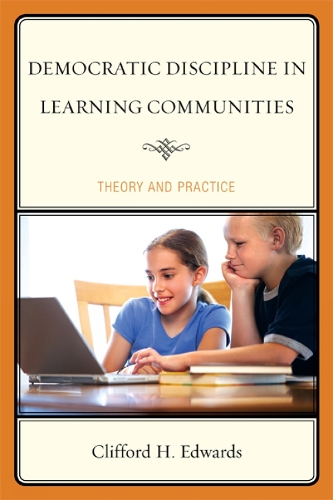
Democratic Discipline in Learning Communities: Theory and Practice
(Paperback)
Publishing Details
Democratic Discipline in Learning Communities: Theory and Practice
By (Author) Clifford H. Edwards
Bloomsbury Publishing PLC
Rowman & Littlefield Education
16th January 2011
United States
Classifications
Tertiary Education
Non Fiction
370.1
Physical Properties
Paperback
196
Width 156mm, Height 231mm, Spine 11mm
304g
Description
This book describes in detail the attributes of learning communities and how these characteristics help students acquire a sense of moral responsibility and commitment to fellow students. Clifford H. Edwards provides an account of how schools fail to satisfy student needs and thus promote discipline problems. Special attention is given to children's need for self-direction and how empowering them can promote more responsible learning involvement. There is also a focus on the factors that motivate learning and those that do not and how teachers can help their students become more intrinsically interested in school learning. Constructivist learning theory is presented as the most accepted explanation of how children learn and how it articulates with the learning community approach to education. The inquiry learning strategy is given as the most effective way to apply constructivist learning theory in classrooms. Appropriate relationships and effective communications are presented as essential components of learning communities and how they accentuate the effectiveness of this learning orientation. Democratic discipline within learning communities is described in detail.
Reviews
Uncooperative students have always been the bane of the dedicated teacher. Many solutions have been put forward, from ancient times to the present, for solving the problems of the disruptive and uninterested student. Yet little has changed over the centuries. The student just doesn't want to learn in most classrooms. Why The root of the problem has gone largely unresolved. True learning most effectively occurs when there is a proper match between the student's needs and the curricular operandi. Dr. Edwards offers the most effective solution to date in the conduct of a learning community wherein learning finds its optimum environment. Under such circumstances the cause of discipline problems is greatly reduced. The classroom can become a joy to student and teacher. -- Larry M. Arnoldsen, EdD, emeritus professor of secondary education, Brigham Young University
School and community leaders recognize that one of the leading detriments to student learning and engagement is the increase in bullying and violence in today's schools. Teacher educator Edwards (formerly, Brigham Young Univ.) reinforces the theory that discipline and curriculum practices must be interrelated. Disciplinary problems often arise, he argues, because students are not sufficiently engaged. Therefore, learning communities should provide children with a sense of moral responsibility, commitment to the community, self-direction, and sense of efficacy. Historically, many discipline theories labeled "democratic" have failed. The organization and content of the book take the reader on an illuminating journey that provides a deeper understanding of the value of nonpunitive classroom procedures, even though many of the students will have experienced punishments and consequences in their schooling. Recommended. General readers, graduate students, research faculty, and professionals. * Choice Reviews *
Author Bio
Clifford H. Edwards is a former professor of science education whose 35 year professional career was spent at Illinois State University and Brigham Young University. He is the author of books and articles primarily in the areas of curriculum and student discipline.
